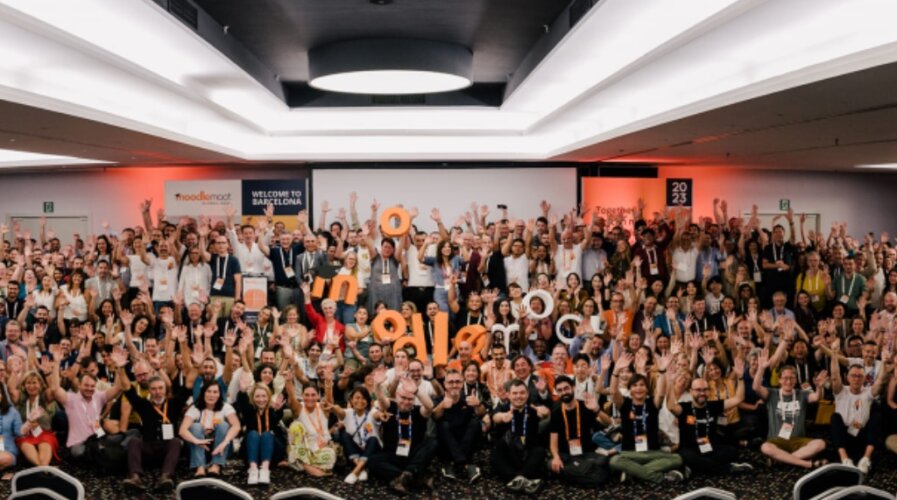
MoodleMoot Global is an annual in-person event where Moodle enthusiasts from all over the world come together to share ideas, collaborate, and learn from each other. Source: Moodle/Facebook
How Moodle continues the dialogue about AI in education
- MoodleMoot Global 2023 took place in the vibrant city of Barcelona from the 19th to 21st of September.
- This year’s themes include how artificial intelligence is changing education and the workplace.
- Moodle’s 4.3 release is scheduled for the 9th of October and will likely contain more than 300 bug fixes, improvements and new features.
In recent years, technology has shaken the higher education arena. With a concoction of artificial intelligence (AI) tools available to teachers and students, more needs to be said and done for various players in this industry to navigate the challenges of teaching in our modern era.
This month, a new UNESCO global survey of over 450 schools and universities found that less than 10% have developed institutional policies or formal guidance concerning the use of generative AI applications.
Moodle, however, is doing its part to continue the conversation about AI in education — a key theme in this year’s MoodleMoot Global, which wrapped up last week in the vibrant city of Barcelona. Taking place from the 18th to 21st of September, over 700 participants from 56 countries and more than 100 speakers from 24 countries were present at the conference.
“It’s a place for the community to meet together, learn about what the other people are doing, [and] learn about what Moodle is doing,” event organizer Diego Fabra explains. “They can meet people from the [headquarters and] ask them questions directly. This is something that doesn’t happen in other conferences.”

Moodle has over 700 participants joining from 56 countries and more than 100 speakers from 24 countries. (Source – X)
What is Moodle?
Moodle’s open-source learning management system (LMS) is free to download, modify and share with others. In their words, it is the “ultimate expression of the values that unite our community of developers, system administrators, educators, and learners.”
As the world’s most popular LMS, it is used by countless schools, universities, non-profits and companies to respond to their education and training needs. Portsmouth Hospitals University NHS Trust, responsible for running the Queen Alexandra Hospital in Portsmouth, Hampshire, has turned to Titus Learning — a certified, premium Moodle partner — to develop a custom Moodle Workplace solution.
Core teams at Moodle HQ coordinate with over 1000 developers who are part of Moodle’s development. Moodle LMS also has an ever-growing community of Certified Partners, developers, system administrators, educators and learners who write new features, fix bugs, update documentation, as well as share resources and ideas to continuously improve the platform.
Since Moodle is a modular system, users can search and download official plugins from the Moodle Plugin Database. They allow users to extend and customize the LMS’s functions beyond what Moodle has envisioned. This flexibility is what makes Moodle collaborative and community-enhanced.
Here are some examples:
- WirisQuizzes: A STEM assessment tool that allows teachers to create and evaluate powerful math question types with equations, graphs, or text-based answers that adapt to the student’s needs and automatically correct students’ tests.
- Adaptable: A highly customizable responsive two-column theme designed for large university installations and small training companies.
- Panopto: A plugin that allows courses to be connected with multiple Panopto servers. Panopto is a video recording and streaming service that allows teachers to record lectures and embed them directly into Moodle.
Moodle’s 4.3 release is set to launch on October 9 and will likely contain more than 300 bug fixes, improvements and new features the LMS teams and community developers have been working on over the last six months.
One standout feature is the new “In Course” communication option that will empower better collaboration. The matrix messaging system will also make working with other messaging systems like Slack and Teams more seamless.

One of the themes in this year’s MoodleMoot Global was examining the impact of AI in education. Source: Moodle.
Rediscovering the potential of artificial intelligence in eLearning
MoodleMoot Global 2023 covered a wide range of interests and expertise within the EdTech space, which included:
- The use of augmented and virtual reality in education and training
- How AI is changing education and the workplace
- Building core competencies with Moodle
- Addressing inclusivity and equity with Moodle courses
- Soft skills revolution — strengthening learners’ critical thinking, interpersonal & creative skills
- Using Moodle to support Science, Technology, Engineering, and Mathematics (STEM) delivery
On the morning of Day Three at MoodleMoot Global 2023, a panel discussion explored the transformative power of AI in education and workplace learning. The session, titled “How Artificial Intelligence is Changing Education and the Workplace” was hosted by Brett Dalto, Head of Education Solutions at Moodle HQ.
It featured a lineup of experts, including Heikki Wilenius from the University of Helsinki, Elizabeth Dalton from IntelliBoard, Rajnish Kumar from Verificient, Tim Hunt from The Open University UK, and Meghan Mencer of Harnessing Your Potential.
Dalto posed three questions to the panel: Are our educational institutions equipped or prepared to address potential AI? How will regulating AI impact the education industry? How will AI have the greatest positive impact on education?
Discussing bias in AI, Dalton suggested that we need to broaden our data to be inclusive of all demographics for AI to be unbiased. Conversely, Kumar from Verificient argued that we should consider the intention behind building an AI system rather than focusing on whether AI is biased.
The panelists also raised thought-provoking questions. Hunt, for example, questioned whether we understand the implications of AI well enough to draft effective legislation. The conversation also touched on how current and future generations will adapt to the growing impact of AI in society.
READ MORE
- 3 Steps to Successfully Automate Copilot for Microsoft 365 Implementation
- Trustworthy AI – the Promise of Enterprise-Friendly Generative Machine Learning with Dell and NVIDIA
- Strategies for Democratizing GenAI
- The criticality of endpoint management in cybersecurity and operations
- Ethical AI: The renewed importance of safeguarding data and customer privacy in Generative AI applications


